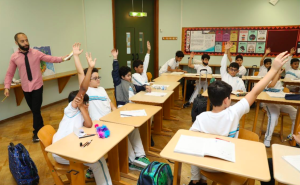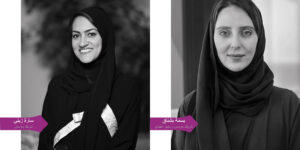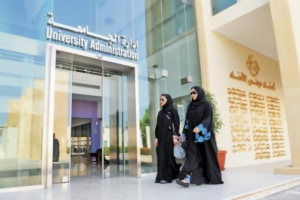The Evolving Landscape of Higher Education in Saudi Arabia
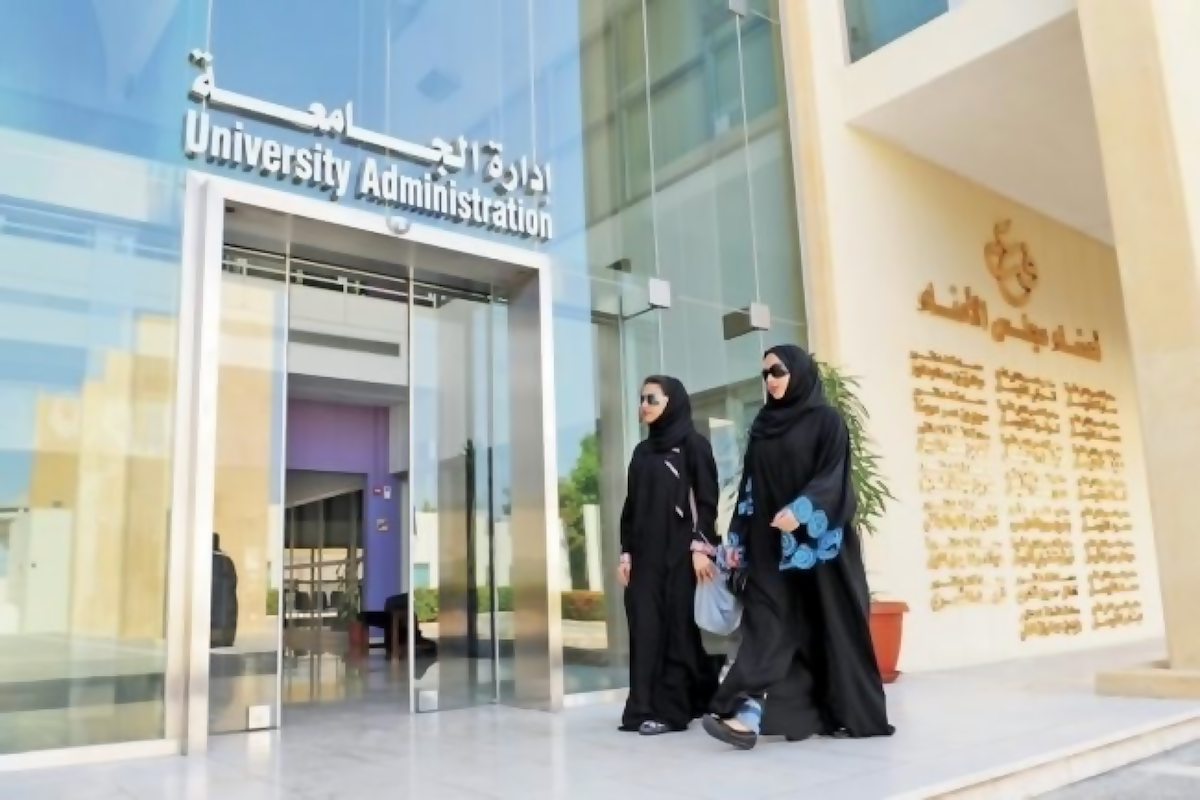
Introduction
In recent years, Saudi Arabia has made remarkable progress in transforming its higher education landscape to meet the demands of a growing population and a rapidly changing global economy. As education development leaders, we recognize the importance of providing insights and solutions to support these ongoing efforts. In this blog post, we look at the changing landscape of higher education in Saudi Arabia, focusing on key areas where the system can be strengthened further.
The Human Capacity Development Program (HCDP), a key element of the recently revised Vision 2030 effort, is one of the driving forces behind these reforms. With the instillation of values, the development of fundamental and future skills, and the advancement of knowledge in various sectors, the HCDP seeks to ensure that Saudi people can compete globally. This program helps all citizens build a strong educational foundation while preparing the next generation for the local and global job market [1][2].
In light of the HCDP’s objectives, we will delve into several key areas for higher education improvement. These include increasing research capacity, promoting academic freedom and intellectual diversity, improving student support services, encouraging lifelong learning and continuing education, and exploring alternative higher education pathways to serve the country’s workforce and industries better. By addressing these areas, Saudi Arabia can continue to build a robust, competitive, and innovative higher education system that supports the nation’s growth and the aspirations of its citizens.
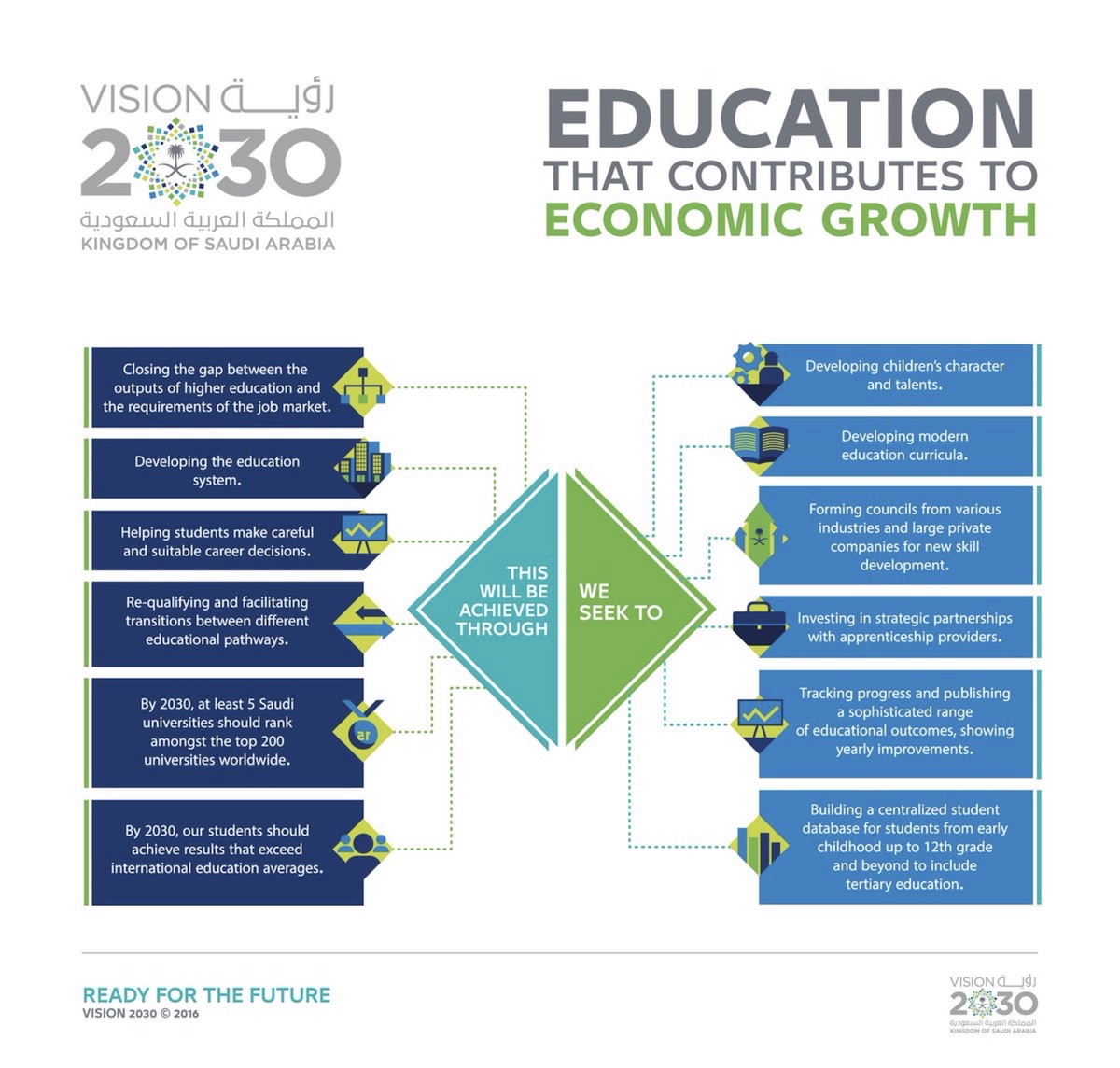
Education as the main motivation for national economic growth and development.
Strengthening Higher Education in Saudi Arabia: Key Areas of Focus
In the past few years, Saudi Arabia has greatly improved its higher education system. This is because the country wants to build a knowledge-based economy and meet the needs of its growing population. To continue this progress, it is essential to focus on critical areas that will further enhance the quality and impact of higher education. Here, we consider five vital aspects: expanding research capacity and intellectual diversity, improving student support services, encouraging lifelong learning and continuing education, and adapting vocational education as a recognized pathway [3].
Expanding Research Capacity
Developing a robust research ecosystem fosters innovation, drives economic growth, and builds a knowledge-based economy. Saudi Arabia has recognized the importance of research and has taken several steps to support it, including:
- The establishment of the King Abdulaziz City for Science and Technology (KACST) plays a pivotal role in promoting research and development in the country
- The creation of King Abdullah University of Science and Technology (KAUST), a top-tier research institution that focuses on graduate-level science and engineering programs
- Increased funding for research, with a target to raise expenditure on research and development to 1.7% of GDP by 2030, up from 0.81% in 2018
- In 2021, Saudi Arabia invested 14.5 billion SAR in research and development, with the government sector contributing the highest percentage of expenditure (50%). Despite the education sector accounting for only 15% of expenditure, it employed the largest percentage of R&D workers (83%), highlight–ing education’s crucial role in expanding the nation’s research capacity [4]
Yet to further expand research capacity, Saudi Arabia should consider the following:
- Strengthening partnerships between universities, research institutions, and the public & private sectors to enable adequate knowledge and technology transfer
- Encouraging interdisciplinary research that addresses complex societal challenges and aligns with the country’s strategic priorities to support the realization of Vision 2030 further
- Increasing international collaborations with renowned research institutions to build capacity, improve research quality, and increase the global visibility of Saudi Arabian research. That is why the Ministry of Education has a Research and Development Office (RDO) that can spend $75 million with international R&D partners. As part of a $1.6 billion effort to boost domestic research and development, the RDO’s international collaboration program seeks new partnerships with UK academic and research institutions [5]
Promoting Intellectual Diversity and Personalized Learning through Technology and Flexibility
A thriving higher education system requires academic freedom, intellectual diversity, and personalization, catering to each student’s unique needs and circumstances. As Saudi Arabia modernizes its education sector, creating an environment that encourages open inquiry, diverse perspectives, and adaptive learning experiences is essential. This can be achieved by:
- Recognizing that no two students are the same and embracing personalization in education According to Dave Keighron, a Higher Education Innovator, Professor, and Entrepreneur at the University of Canada West, institutions must fast-forward towards creating one-to-one relationships with students to cater to their needs, learning styles, and life circumstances [6]
- Leveraging AI-driven personalized learning programs like Chat GPT to design tailored curricula that respond to each student’s unique learning style and goals; By utilizing artificial intelligence, educational institutions can ensure that students have access to a diverse curriculum and are equipped with the knowledge and skills necessary for success in a rapidly evolving job market
- Offering flexibility through hybrid learning models that accommodate various lifestyles. Students can balance their education with work, family, or other personal responsibilities by having a mix of online and in-person learning opportunities. This approach enables higher education institutions to reach a broader audience and adapt to the changing needs of their students [6]
- Utilizing surveys and other feedback channels to continuously assess and adjust educational programs based on student preferences and values. By regularly seeking student input, educators can ensure higher engagement levels and tailor their teaching methods to meet their learners’ expectations better [6]
- Integrating practical programs and opportunities for college students to develop employability skills by offering workshops, internships, and mentorship opportunities, students will gain hands-on experience and exposure to various industries and professional environments, preparing them for future careers aligned with Vision 2030
- Attracting and hiring internationally recognized and highly accomplished faculty with diverse backgrounds, experiences, and expertise. By bringing together a diverse group of educators, students will benefit from various perspectives and teaching methodologies, further enhancing their educational experience and promoting intellectual diversity
Improved Student Support Services
To promote student success and well-being, student support services are essential. Institutions must be equipped to meet the diverse needs of their student populations as the higher education landscape in Saudi Arabia changes. You can achieve this by:
- Offering comprehensive academic advising and career counseling services to students, empowering them to choose their educational and professional trajectories through informed decisions
- Implementing strong mental health and wellness initiatives is vital to promoting student success in higher education. By addressing the rising mental health problems in young people and providing comprehensive support for students and staff, institutions can foster a healthy and productive learning environment for the entire academic community
- Targeted support for underrepresented and marginalized student populations, including those from low-income or under-resourced backgrounds and students with special educational needs
Encouraging Lifelong Learning and Continuing Education
In today’s rapidly changing world, individuals must engage in lifelong learning to remain competitive in the job market and adapt to evolving industry needs. Saudi Arabia can foster a culture of lifelong learning by:
- Developing continuing education programs and short courses that cater to the needs of working professionals and adult learners
- Encouraging employers to invest in employee professional development, recognizing the value of upskilling and reskilling their workforce
- Promoting the concept of a “growth mindset” and embracing the idea that learning is a continuous process not limited to formal educational settings
Adapting Vocational Education as a Pathway to Career Success and Skill Development
Vocational education is crucial in preparing individuals for career success and skill development. By offering practical training and hands-on experience, vocational education serves as a viable alternative to traditional academia and provides numerous benefits, such as:
- Direct pathway to career success: Emphasizes hands-on training and practical knowledge, equipping students with technical skills for specialized industries. This aligns with introducing new programs and curricula to meet the demands of emerging fields like tourism, arts, and culture, as envisioned in Vision 2030
- Real-world applications and experiences: Prepare students for workforce entry. Industry partnerships help tailor curricula to employers’ needs, ensuring relevancy and providing networking opportunities, internships, and apprenticeships. Engaging in real-world activities develops communication skills, self-confidence, and deeper understanding through authentic experiences, better equipping students for success
- Time and cost-effectiveness: Shorter duration compared to four-year degrees allows students to start their careers sooner, often with industry-recognized certifications
- Recognition and accreditation are essential in promoting vocational education as a valuable career pathway, ensuring that programs are recognized nationally and internationally.
- Addressing skills gaps and labor shortages: Tailored training to meet job market demands strengthens the workforce, promoting sustainable development and economic growth. Vocational education providers should consider offering flexible learning options, such as online courses, part-time programs, and modular courses, to cater to diverse learners’ needs. This enables individuals to pursue vocational training while balancing other life commitments, such as work or family
As the job market evolves, the emphasis on competence in higher vocational education has grown significantly. To understand this trend and its implications better, consider exploring the article Competences and Vocational Higher Education: Now and in Future. This insightful piece delves into the challenges and design of competence-based education, emphasizing the need for further research to ensure graduate preparedness.

Wrapping It Up
The evolving landscape of higher education in Saudi Arabia reflects the nation’s ambitious efforts to build a knowledge-based economy, support its growing population, and align with the goals of Vision 2030. As the country continues to progress, focusing on key areas such as expanding research capacity, promoting intellectual diversity, improving student support services, encouraging lifelong learning, and adapting vocational education will further strengthen its higher education system.
Higher education in Saudi Arabia is undergoing a transformational journey, and we at Emkan Education are proud to continue contributing to this progress. Addressing challenges and capitalizing on opportunities is essential for the country’s higher education system to thrive. Collaborative efforts between educational institutions, the government, and industry will be crucial in shaping a future-ready workforce.
By addressing these crucial aspects, Saudi Arabia will be well-positioned to develop a competitive, innovative, and inclusive higher education system that fosters the growth and aspirations of its citizens. We look forward to continuing our work toward fulfilling our vision of improving the educational ecosystem in Saudi Arabia and the broader region. The road ahead is filled with opportunities and challenges, but with a strong commitment to education and innovation, the kingdom is poised to become a global leader in higher education. Until next time, happy learning!
References:
[1] Vision 2030
[2] Human Capability Development Program: Vision 2030
[3] Education | The Embassy of The Kingdom of Saudi Arabia
[4] General Authority for Statistics
[5] Glubb, S. (2018, June 26). Saudi Arabia seeks new UK R&D partnerships in line with Vision 2030
[6] Digital Marketing Institute: 6 Higher Education Trends to Know in 2023
[7] Salon Privé Magazine: 5 Higher Education Trends To Watch In 2021
[8] Salesforce.org: Top 5 Higher Education Trends for Colleges and Universities
[10] ERIC
Most Popular
